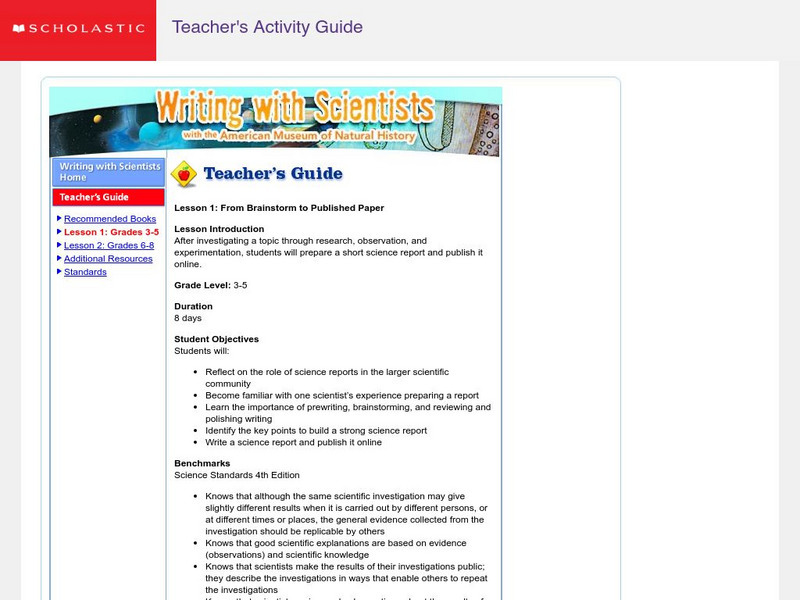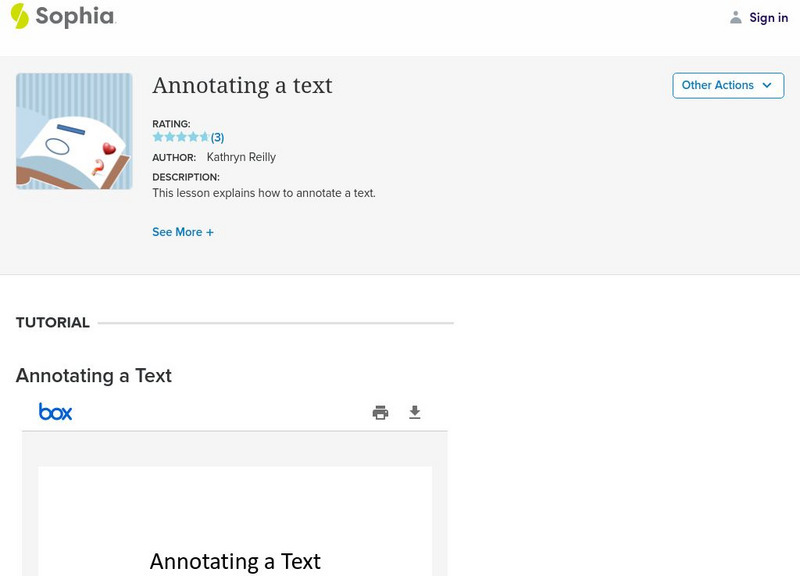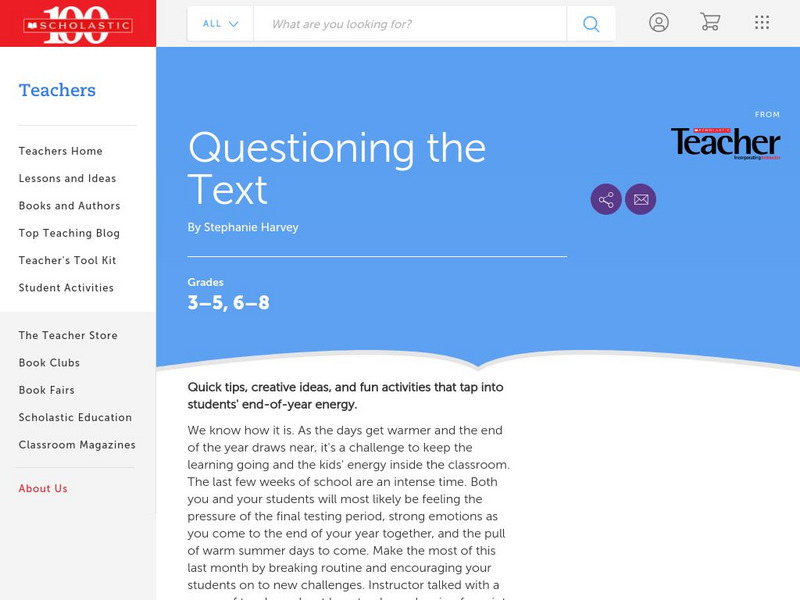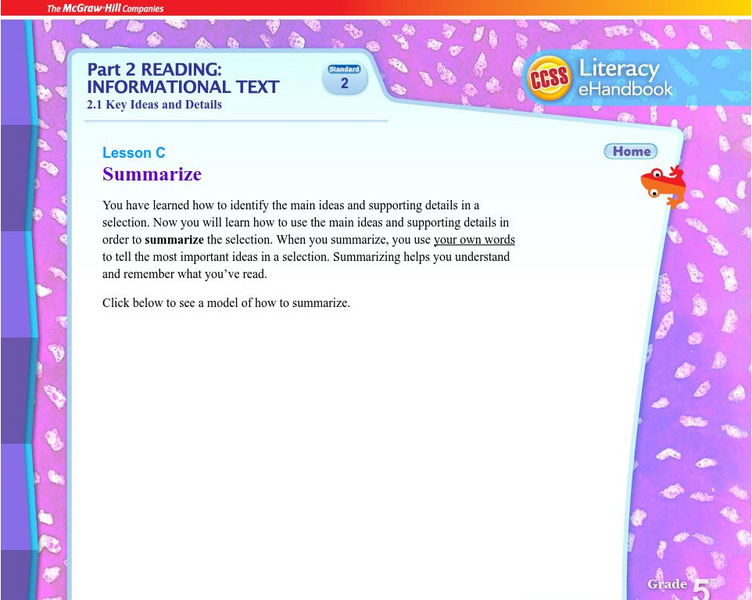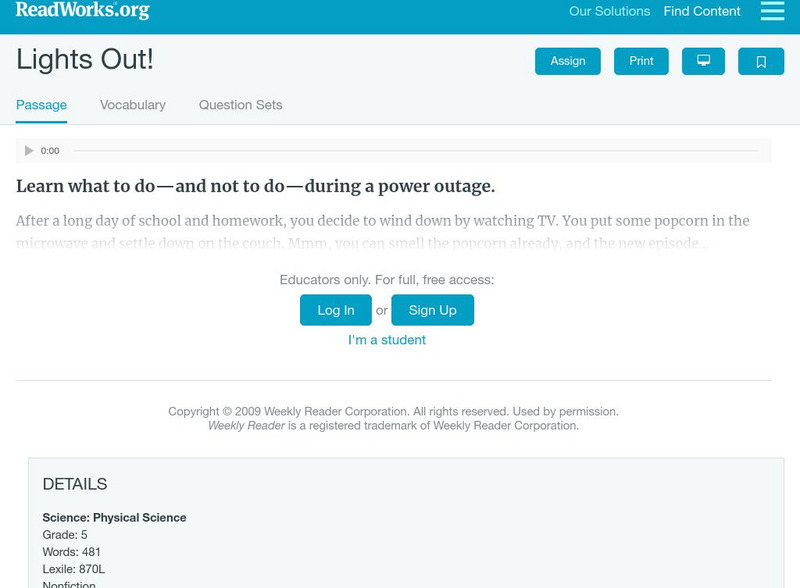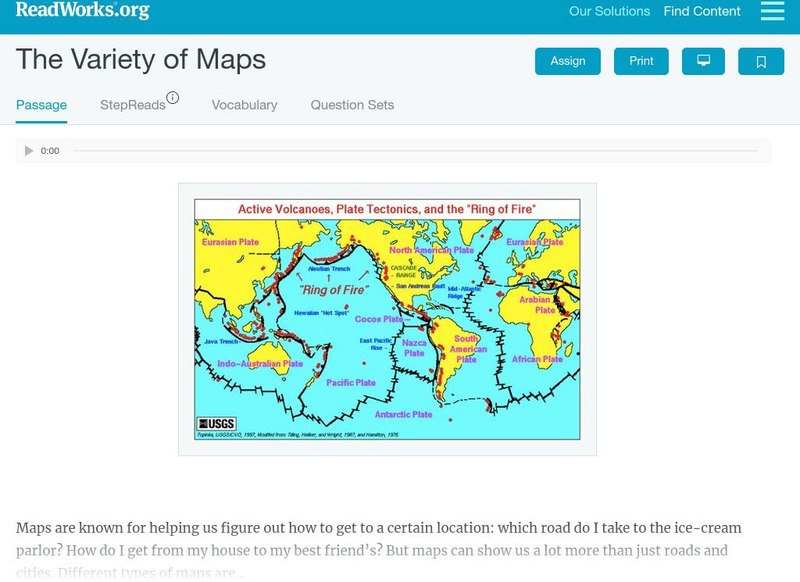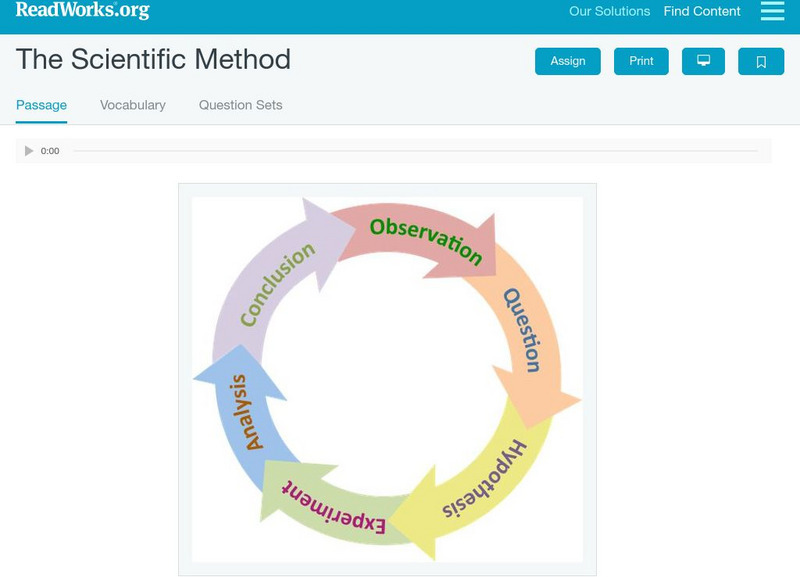Scholastic
Scholastic: Writing With Scientists
After students investigate a topic through research, hypothesizing, observing, and experimentating, teachers can use this lesson to help their students prepare short science reports and publish them online. The Writing with Scientists...
Utah Education Network
Uen: Introducing Text Structures in Writing 5th Grade
This lesson engages students in learning about text structures. Graphic organizers are provided to assist students in planning writings that have the following text structures: problem and solution; sequence; cause and effect; and...
Utah Education Network
Uen: Setting a Purpose for Reading Using Informational Text
This activity engages students in using a two-column graphic organizer to take notes. Students will record titles and subtitles and list questions that will correspond with each one.
Sophia Learning
Sophia: Annotating Text
This slideshow focuses on the reading strategy, annotating text. It defines the term and purpose, lists types of annotation, explains what to annotate, and suggests how readers develop their own method.
CommonLit
Common Lit: Where Did I Come From
CommonLit.org is a wonderful resource to use in a Language Arts classroom. Each story or article is accompanied by guided reading questions, assessment questions, and discussion questions. In addition, students can click on words to see...
AdLit
Ad lit.org: Develop Fluency Using Content Based Texts
Fluency is the missing piece of the reading puzzle for many older students. They can decode, but they cannot do it automatically and accurately enough to comprehend text. Here are some fluency-building activities to complement content...
Scholastic
Scholastic: Questioning the Text
In this magazine article originally featured in Instructor, the reading strategy called "questioning the text" is explained by the renowned literacy consultant and staff developer, Stephanie Harvey. The steps included for questioning the...
Beacon Learning Center
Beacon Learning Center: Web Lesson: Did I Read It: Implicit vs Explicit Details
Follow Carson through a lesson in order to become a better reader of informational text. Learn the difference between implicit and explicit information. Includes multiple interactive assessments and reading activities.
Writing Fix
Writing Fix: The Wacky "I Will Not" Chalkboard
Students can use this writing idea from the book Wacky We-Search Reports by Barry Lane to demonstrate understanding in any content area. Students use the idea of writing "I will not " sentences to show their knowledge of various...
Curated OER
Mc Graw Hill: Part 2 Reading: Informational Text: Summarize
Learn how to summarize a text based on the main idea and supporting details you found.
Curated OER
Mc Graw Hill: Part 2 Reading: Informational Text: Summarize
Learn how to summarize a section of a text with this site.
Curated OER
Mc Graw Hill: Part 2 Reading: Informational Text: Evaluate Arguments and Claims
This article will help you evaluate informational text to determine whether an author's argument is supported by evidence or not. Click on Model to see a model with explanations and then click on Practice.
Curated OER
Mc Graw Hill: Part 2 Reading: Informational Text: Show Understanding of Text
This quick activity includes a passage from an information text, and explains reading comprehension strategies to use to answer questions.
Curated OER
Mc Graw Hill: Part 1 Reading: Literature: 5th Grade Quote Accurately
An article describing the importance of making inferences while reading a story.
Austin Independent School District
Austin Independent School: 10 Major Types of Inference in Literature [Pdf]
This printable worksheet helps students recognize the difference between an implication and an inference. Students are presented with quotes from the text and they practice with each of the ten types of inference: location, agent, time,...
Read Works
Read Works: Lights Out
[Free Registration/Login Required] An informational text explaining what to do when the power goes out. A question sheet is available to help students build skills in reading comprehension.
Read Works
Read Works: The Variety of Maps
[Free Registration/Login Required] An informational text about many different types of maps and the people who make them. A question sheet is available to help students build skills in reading comprehension.
Read Works
Read Works: Sticky Fingers, Helping Hands
[Free Registration/Login Required] An informational text about chocolate, where it comes from, and how it is made. A question sheet is available to help students build skills in reading comprehension.
Read Works
Read Works: The Scientific Method
[Free Registration/Login Required] An informational text explaining the five steps of the scientific method. A question sheet is available to help students build skills in reading comprehension.
Read Works
Read Works: Fourth Grade: One Lesson Unit: Drawing Conclusions
[Free Registration/Login Required] Students are guided through a lesson to understand the difference between explicit information and conclusions drawn from a text. With free login, users have access to passages used in this lesson.
Other
Pennsylvania Doe: Lesson Plan: Making Inferences and Drawing Conclusions
In this lesson the teacher uses modeling and questioning strategies to walk students through making inferences in various texts and then using those inferences to draw conclusions.
Hopelink
Hopelink: Reading Lesson Idea: Qar a Reading Comprehension Strategy
Brush up on your reading comprehension skills when you check out this website. It looks at a particular strategy called QAR. QAR stands for "Question-Answer Relationships." This particular strategy helps students learn to answer reading...
E Reading Worksheets
E Reading Worksheets: Making Predictions Worksheets and Lessons
In this learning module, students will learn more about making predictions in reading. Worksheets and a leson are provided to support Tier I, Tier II, and Tier III students.
Polk Brothers Foundation Center for Urban Education at DePaul University
Depaul University: Center for Urban Education: I Can Explain an Inference [Pdf]
This tool can be used to help students articulate their answers about fiction pieces. Students will quote the text, provide an inference, and give a justification.
